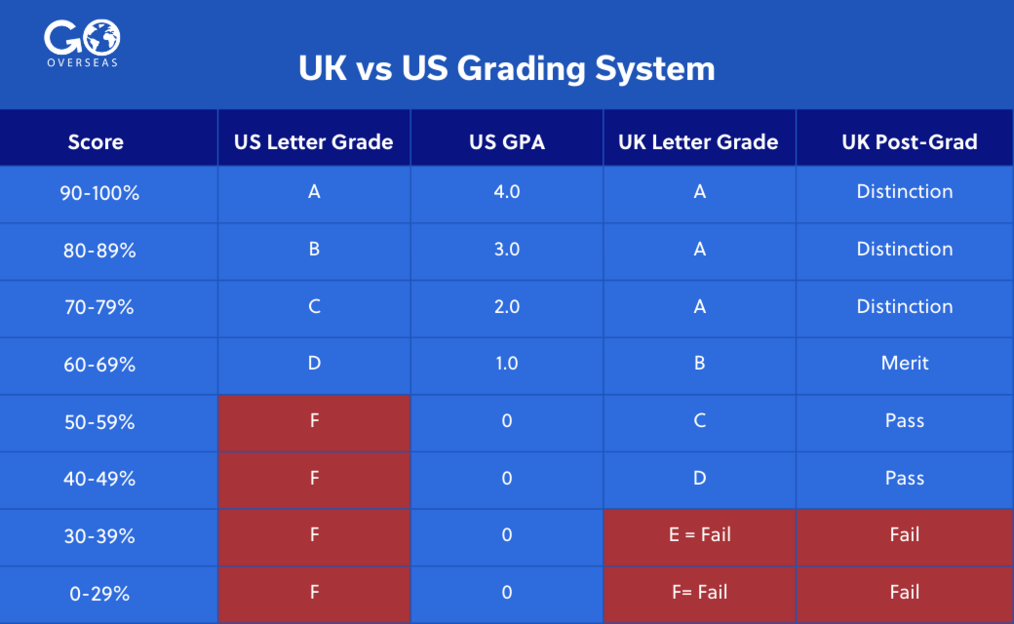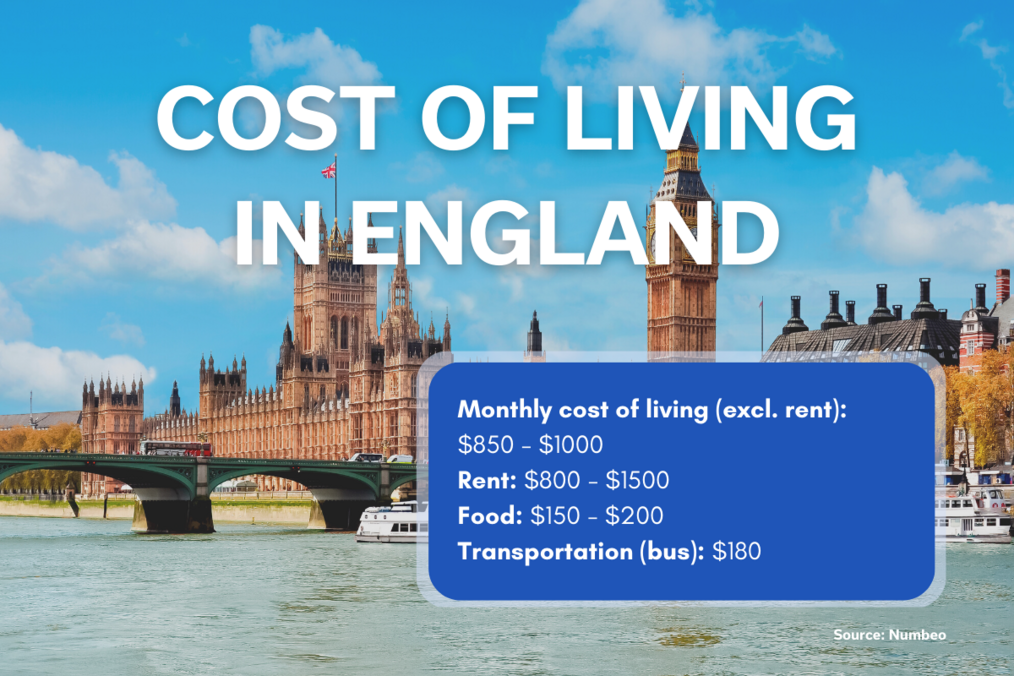
Study in the UK vs the US: Which is Better for Your Master's Degree?
Learn the benefits, drawbacks, and considerations of pursuing your master’s degree in the US compared to the UK to determine which country best matches your academic goals and aspirations.
Key Takeaways 🔑
- The shorter program length is a major difference between studying in the UK vs the US. Master’s programs in the UK typically last one year, while programs in the US last two years on average.
- In the UK, master’s programs can cost as much as £30,000 ($37,000) per year. However, on average, master’s degree tuition in the US can range between $20,000-$30,000 per year.
- While there are benefits and drawbacks to studying in the US and the UK, both options will be as rewarding as the amount of work you put in before and during your master’s program.
Continuing your education by pursuing a master’s degree is a fantastic opportunity to bolster your credentials, expand your perspective, and differentiate yourself from your peers in the job market. Challenging yourself to pursue a degree abroad, such as a master’s program in the United Kingdom, will add additional challenges and benefits as you learn to adapt to an unfamiliar environment and immerse yourself in a new culture.
While both the US and UK provide students with fantastic master’s degree program options, there are a few distinctions between the two systems and academic cultures you should be aware of. While pursuing a master’s in Scotland, I experienced many of these firsthand. What stood out the most, though, was the irreplaceable connections and human moments with people from across the globe.
My experience doesn’t mean the UK is the right place for you. Read on to learn the benefits, drawbacks, and considerations of pursuing your master’s degree in the UK compared to the US to determine which country best matches your academic goals and aspirations.
Pros and cons of pursuing a master’s degree in the UK

While studying in the United Kingdom has many unique advantages, it’s important to consider the challenges you will face by moving abroad.
✅ Pros:
- Exposure to an international work environment: Master’s degrees in the UK are filled with international students from across the world.
- Shorter program lengths: Masters programs in the UK typically last one year vs 2+ in the US.
- Program depth: Master’s programs in the UK tend to be highly specialized.
❌ Cons:
- Expensive international tuition fees: The cost of tuition for Master’s programs in the UK can be high, especially for international students.
- Limited funding opportunities: There may be limited funding options for international students in the UK. FAFSA loans, however, can be applied toward UK tuition.
- Narrow focus: Students don’t typically take courses outside of their specific degree specialization.
Pros and cons of pursuing a master’s degree in the US
The United States maintains global recognition for its academic rigor and opportunities for professional development. That said, there are limitations to studying in the US when compared to other countries, such as the UK.
✅ Pros:
- Vast program options: The US has a wide range of Master’s programs available in many different subject areas.
- World-renowned research opportunities: US universities host some of the top research facilities in the world.
- More funding: From federal student loans to private scholarships and grants, the US may have more funding options that you qualify for.
❌ Cons:
- Longer program lengths: Master’s programs in the US typically last two years or more.
- Overall cost: The longer program lengths increase total tuition expenses and opportunity costs.
- Familiarity: While this could be good and bad, continuing to study within the system you’re used to provides fewer growth opportunities relative to the challenges of adapting to another system.
Applying for a master’s program in the UK vs. the US

UK Master’s applications are typically handled through UCAS, a centralized system for UK university enrollment. Through a single application process, prospective students upload transcripts, reference letters, and personal statements for review and consideration by all universities to which they apply. Some universities may require additional application materials, such as writing samples or portfolios, so ensure you review the process for your specific university and program before submitting.
Universities in the US individually manage applications and typically require transcripts, reference letters, standardized test scores, and an essay response to a unique prompt. This means, in contrast to the UK, you'll need to apply individually to each university you're interested in attending.
Additionally, universities in the UK have application deadlines much closer to the start of the relevant term, while US universities require applications to be submitted far ahead of time. That said, it is best to get your applications in as early as possible, no matter the country, to provide yourself enough time to find and apply for funding.
Grading systems in the US vs. the UK
The grading systems used in the UK and the US are quite different. In the UK, Master’s programs use a degree classification system where students are graded from "distinction" to "fail." Assignments are graded on a scale of 1-23. Be sure to reference each university grading policy to determine the number associated with each classification.
In the US, the grading system uses letters, with "A" representing the highest grade and "F" representing a failing grade. At the postgraduate level, a D is often not sufficient to be awarded a degree.
Personally, I found the UK grading system to be confusing at times, so we created a chart that provides a comparison between the two approaches:

Master’s degree program length in the US vs. the UK
A significant benefit to studying in the UK compared to the US is the shorter program lengths. Master’s programs in the UK typically last one year, while programs in the US last two years on average. However, some US universities may offer accelerated programs that can be completed in one year.
Additionally, the academic calendar of a 1-year master’s program in the UK will not include a traditional summer vacation and often require a dissertation or internship to be completed during the program.
US vs. UK master’s degree cost comparison

The cost of tuition for master’s programs in both countries vary widely between public vs private universities and depend on the cities in which they’re located.
In the UK, master’s programs can cost as much as £30,000 ($37,000) per year. However, on average, master’s degree tuition in the US can range between $20,000-$30,000 per year. Keep in mind, the average master’s program is one year in the UK, so you would only need to pay for one year’s worth of tuition, vs paying for 2 years in the US.
To compare the overall cost of studying in each country, you’ll need to consider your cost of living and other expenses. To gain an accurate sense of how much you should expect to spend, use tools like Numbeo.
Read more: How Much Does it Cost to Study Abroad in England?
Other things to consider
Outside of the educational systems, there are additional crucial considerations when deciding between pursuing a master's degree in the US or the UK. These include:
- Visa requirements: As an international student, you'll need to obtain a visa to study in either country. The application process, requirements, and costs vary depending on the country, so ensure you research and plan accordingly.
- International banking: If you're moving from another country to study, you'll need to local bank account. Look for banks that offer student accounts, such as HSBC.
- Housing: Finding affordable housing can be a challenge, especially in popular student cities like London. Consider options such as university housing, shared apartments, or homestays.
- Healthcare: In the US, healthcare costs can be high, and international students may not be eligible for insurance through their university. In the UK, international students are usually eligible for free or low-cost healthcare through the National Health Service (NHS); however, there is an upfront NHS expense to obtain your visa.
- Degree transferability: If you plan to return to your home country or work internationally after completing your degree, it's important to research whether your degree will be recognized in your home country.
- Expectations: The academic and professional culture in the US and the UK can differ, affecting your student experience and future job prospects. Be prepared to adapt to an unfamiliar working environment and consider which country has the best opportunities for your specific career goals.
Pro tips for maximizing your experience studying in the UK

If you've decided that taking on the challenge of pursuing your master's degree in the UK is worth it, there are a few things you can do to make the most of your experience.
Tips for studying abroad in the UK:
- While studying in the UK, you'll have the chance to experience a new country and culture. Take advantage of this by immersing yourself in local customs, trying new foods, and visiting historical and culturally significant landmarks.
- Building an international professional and personal network is a significant benefit to pursuing a degree abroad. Connecting with other students and professors in your program can lead to valuable opportunities, such as research projects or job offers. Attend social events, join student organizations, and actively network to build relationships.
- International students in the UK are eligible to work part-time during their studies. This can provide valuable work experience and help cover living expenses. Look into internships in your field to gain experience and build your resume.
- Culture shock is a common experience of many who study overseas. Be prepared for differences in academic expectations and social norms. Take time to learn about the culture and customs in the UK, and don't hesitate to ask questions or seek support if needed.
But, which country is right for you?
My experience pursuing a master's degree in the UK was transformative. The connections I made and the challenges I endured enabled me to improve as a friend, student, and colleague. My life circumstances are different than yours, though, and making a decision between studying in the US or the UK is challenging. So in summary:
🇬🇧 You should study in the UK if….
- You want to earn your degree at an accelerated pace
- You want a culturally immersive experience
- You have a clear idea of your specialization
- You enjoy challenging yourself and are comfortable far from home
- You want to build an international network
🇺🇸 You should study in the US if…
- You want a broader courseload
- You enjoy the highly structured US academic system
- You are interested in building a professional network in your home city or country
- You want the most access available to funding opportunities
- You'd prefer to stay close to home or are not ready to travel out of the country
Plan ahead to get the most out of your master’s degree

Pursuing a master's degree in the UK can be a meaningful experience filled with unique challenges and culturally immersive experiences. With a shorter program length than comparable US programs, UK degrees are a fantastic alternative that combines living abroad with a world-class education system. While there are benefits and drawbacks to studying in the US and the UK, both options will be as rewarding as the amount of work you put in before and during your master’s program.
For me, a UK master’s degree was the right decision to move my career forward without taking a multi-year-long hiatus from work. If you believe studying in the UK is the right choice for you, too, we’re here to help make your dreams a reality!
Take the next step towards a master’s degree abroad by reading the following articles:






